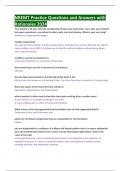Questions And Answers
Prepared water samples bottles used for collecting samples for bacteriological
examination contain sodium thiosulfate crystals. It is important not to rinse out the
sample bottle because the sodium thiosulfate: eliminates the need for refrigeration of
the sample, neutralizes any chlorine present in the sample, the test for it is relatively
inexpensive and easy to perform, all of the above. CORRECT ANSWERS neutralize
any chlorine present in the sample
In NC, the drinking water quality standards are enforced by CORRECT ANSWERS The
N. C. Division of Water Resourses, PWSS
The number of monthly samples required for bacteriological analyses is based on
CORRECT ANSWERS Population served
(NC) State Rules governing public water systems require records of bacteriological
analyses be kept on or near premises for a minimum of CORRECT ANSWERS 5 years
NC Division of Water Resourses-PWSS Rules require the control and upward
adjustment of the ph of drinking water if it is below a level of CORRECT ANSWERS 6.5
Which of the following well types is most protected from surface contamination?
artesian well, infiltration gallery, rock well, shallow well. CORRECT ANSWERS artesian
well
a single sample taken without considering the time of day or rate of flow is called a
CORRECT ANSWERS grab sample
The Total Coliform Rule is based first on, presence or absence of coliforms in a sample,
density of coliform in a sample, type of coloforms in a sample, presence or absence of
coliforms in a sample CORRECT ANSWERS presence or absence of coliforms in a
sample
The primary origin of coliforms in water supplies is, natural algae growth, industrial
solvents, bacterial contamination, acid rain CORRECT ANSWERS bacterial
contamination
Which of the following best describes "chlorine demand": the difference between the
amount of chlorine added and turbidity, the difference between the amount of chlorine
added and ph, the difference between the total chlorine residual and the free chlorine
risidual, the difference between the amount of chlorine added and the amount of
residual chlorine remaining after a given contact time. CORRECT ANSWERS the
, difference between the amount of chlorine added and the amount of residual chlorine
remaining after a given contact time
If an initial sample is positive for total coliforms and a repeat sample sample is positive
for fecal or E-coli; notice to the public must be given by broadcast media (television and
radio) within: 24 hours, 48 hours, 72 hours, 14 days CORRECT ANSWERS 24 hours
Check valves are used to prevent: excessive pump pressure, priming, water from
flowing backward, water hammer CORRECT ANSWERS water from flowing backward
An operator hears a pinging sound coming from the pump. What is the probable cause:
descaling, cavitation, corrosion, hardness. CORRECT ANSWERS cavitation
During a routine inspection on a centrifugal pump, the operator notices that the bearings
are excessively hot. This is most likely caused by: over lubrication, the speed being to
slow, a worn impellar, a worn packing CORRECT ANSWERS over lubrication
The leakage of seal water around the packing on a centrifugal pump is required
because it acts as a(n): ahesive, coolant, corrosive inhibitor, scale inhibitor. CORRECT
ANSWERS coolant
Sodium Tiosulfate is used to: buffer chlorine solutions, neutralize chlorine residual,
detect chlorine leaks, sterilize sample bottles. CORRECT ANSWERS neutralize
chlorine residuals
The presence of total coliforms in drinking water indicates: the presence of pathogens,
the absence of adequate chlorine residuals, the existence of an urgent public health
problems, the potential presence of pathogens. CORRECT ANSWERS the potential
presence of pathogens
a primary health risk associated with microorganisms in drinking water: cancer, acute
gastrointestinal diseases, birth defects, nervous system disorders CORRECT
ANSWERS acute gastrointestinal diseases
A major health risk associated with nitrates is: cancer, acute respiratory diseases, "blue
baby" syndrome, reduced I.Q. in children CORRECT ANSWERS "blue baby" syndrome
When calcium hypochlorite is used for disinfecting a water supply, it should be:
dissolved in water allowed to settle and supernatant siphoned off and fed into the water
system, dissolved in water as a dry chemical then injected into the water system, fed as
a dry chemical directly into the pipeline, fed as dry powder into the clear well.
CORRECT ANSWERS dissolved in water as a dry chemical, allow to settle , and the
supernatant siphoned off and fed into the water system



